Fossils indicate that alligators have been in North America for eight million years.
Not only have they been hanging out for all this time but, unlike most species, they haven’t changed a bit.
While everything else was evolving to have a better grasp on the environment, the alligator opted out.
Apparently, the savvy hunter decided it was perfectly adept.
If that’s not self-love, what is?
That makes it equally sad and confusing how they were almost hunted into extinction.
Luckily, they’re still around to study and be afraid of.
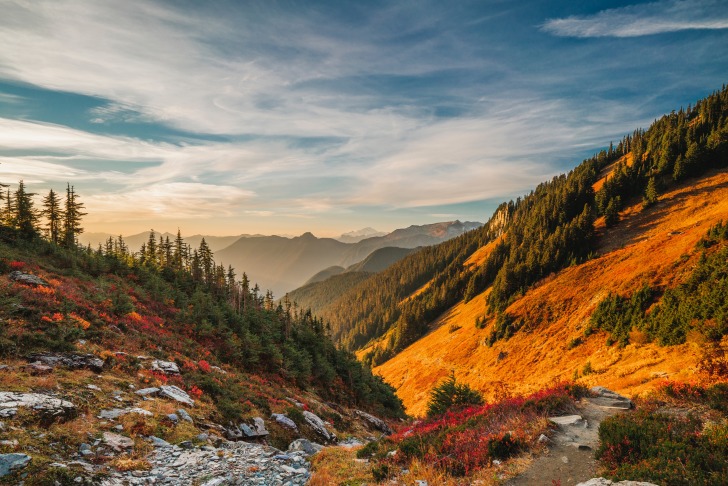
Contents
- So… Are There Alligators in Washington State?
- Alligator Species in Washington State
- Is it Safe to Swim in Washington State?
- Interesting Alligator Facts in Washington State?
- Alligators vs. Crocodiles
- 3 Safety Tips for Swimming in Alligator-infested Waters
- Washington Safety Overview
- Frequently Asked Questions
So… Are There Alligators in Washington State?
Another point for luck is our location.
Being in Washington State, we’re exactly the opposite of where alligators live.
So, when we go to our favorite lake, stream, or river, there is no fear of being attacked or eaten by an alligator.
If you’re looking to find one in the wild to watch and not to approach, you need to head southeast.
Alligators have been found everywhere from North Carolina, down through Florida, and out to east Texas.
Alligator Species in Washington State
Well, there aren’t any alligators in Washington, but if there were, it would most likely be the American alligator.
There are five million American alligators that can call the US home and all of them are American.
No, none of them know the National Anthem.
Is it Safe to Swim in Washington State?
Yes, if your biggest fear is in the water is an alligator.
However, just because Washington doesn’t have alligators doesn’t mean there aren’t other things in the water.
Here are a handful of nautical non-friends to look out for:
- Northwest Tree Octopus
- Gush Gush Monster of Lake Lacamas
- Caddy the Cadborosaurus
- Willatuk
Of course, there are no perfectly safe bodies of water, but the beaches, lakes, and rivers of Washington State are relatively harmless.
If there is any suspicious activity going on, rest assured the authorities will be notified.
Well over half of Washington’s population is in the Seattle area.
If you know anything about this state, you know that it’s basically surrounded by beaches.
Even though the water is usually pretty chilly, there are still plenty of activities that are aquatic by nature.
Interesting Alligator Facts in Washington State?
Loch Meridian Alligator
In 2016, a mystery hit the town of Kent.
Half an hour south of Seattle lies Lake Meridian.
On one hot summer day, a group of swimmers had congregated in the water.
An eagle-eyed visitor noticed something surely no one else was prepared for.
Thankfully, it wasn’t quite as dramatic as someone yelling, “Shark!”
Still, there was something in the water and it made a whole lot of people uncomfortable.
To be fair, it was not confirmed to be a reptile at all, but that hasn’t stopped the fear.
The local authorities notified anyone coming up to Lake Meridian about what had been reported.
He might still be out there, somewhere.
Mt. Rainier Alligator
Alright, so even though we have gone through the reasons why there are no alligators in this region of North America, that hasn’t stopped people from believing they saw one.
This time, it was north of Seattle by Mount Rainier in Clear Lake.
Officials were dispatched to the scene and were unable to ascertain the whereabouts of any massive reptile.
A large part of the reason why, even if one made it this way, it wouldn’t survive comes down to temperature.
Alligators aren’t fans of cold water, and this stuff was frigid.
Non-wild Alligators
The likelihood of finding an alligator in Washington by accident is pretty much zero.
That doesn’t mean they aren’t here by other means.
Washington State University has become the caregiver of three alligators in recent years.
Two were brought to WSU after they had been found at frat houses at the school.
Bored guys looking for problems found baby alligators online that they were able to purchase and have shipped.
The third was rescued from a private home that was trying to raise it.
The people who had taken possession of the alligator were feeding him a strange diet of chicken nuggets.
The reptile became severely malnourished and needed professional intervention.
Happily, the alligator recovered and was eventually relocated to a reptile center in Washington.
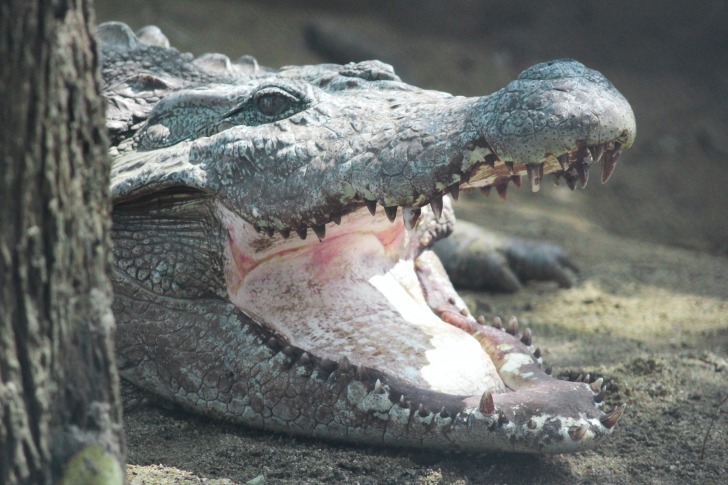
Alligators vs. Crocodiles
Two scary guys that haven’t needed to evolve in millions of years have more in common than they know.
In fact, most people would confuse the two, in the event they met up face-to-face with either.
In that scenario, it’s unlikely you’d have the time to pinpoint everything you need to look for.
So, we’re here to help in that hopefully never happening nightmare.
Snouts
To start with, alligators and crocodiles have different-looking heads.
That all comes down to the snout.
Alligators have a wide U-shaped mouth where the front end is flatter like a pancake.
Crocodiles’ mouths come to a point, like a V. In order to accommodate that, they are bulkier in the face.
Pressure Receptors
Both reptiles have pressure receptors but not in the same places.
The point of this is so that they can be aware of any movement.
It doesn’t take much to cause waves.
An alligator’s receptors are on his jaw.
They present as a group of black dots.
Crocodiles have receptors all over themselves and they are clear.
Ocean vs Lake
Being cold-blooded is where the connection between these two ends when it comes to temperature.
Alligators have the advantage of being able to tolerate water that is chillier than crocodiles.
Crocodiles are unable to survive in the cold.
Alligators may prefer it warmer but they are adaptable.
Not so adaptable, though, that they could live in just any water.
It’s freshwater all the way for alligators.
Crocodiles, however, can take go on a beach day when they want to.
3 Safety Tips for Swimming in Alligator-infested Waters
1. Wear Safety Gear
If you’re on a boat in Washington, you’re required to wear a life jacket.
In fact, all boats are required to have as many life jackets on board as there are people on board.
Not only can one of these preservers save you from all types of water, but they can also help quickly alert anyone nearby about an issue.
Do you know the reason Queen Elizabeth II wore bright colors all the time?
For the same reason you wear a brightly colored life jacket, they are easy to spot in distress.
2. Follow the Signs
Before you agree to dip your toes into any body of water, take a solid look around.
Don’t get fooled by excitement and fail to be thorough in your investigation of a place.
Even better, do a little research before you hit the road in the first place.
The last thing you want is to be blindsided by creatures you weren’t expecting.
When you pull up, look for any and all signs with information about the body of water you’re in.
Go into a visitor center if it has one.
Ask an expert.
Know what you’re getting into before you get into it.
Also, the city of Seattle stipulates that swimmers must stay within 50 feet of the shore.
That way you’re less likely to run into anything suspicious.
3. No Late-Night Shenanigans
Unlike humans, alligators are most active at night.
Well, not all humans.
If you’re like so many who can’t function during the day but are wide awake at night, perhaps you have some alligator at you.
Okay, so that’s not a thing, but it is true about alligators’ hunting behavior.
Any time during the night and up through dawn, it’s an alligator hunting ground.
Of course, there are plenty of people who choose that as a great opportunity to do some moon bathing.
Don’t catch yourself doing such in an area that is known for alligators.
They might just mistake you for bait.
Washington Safety Overview
READ THE FULL REPORT: Washington Safety Review
Safety Index:
- OVERALL RISK: LOW
- TRANSPORT & TAXIS RISK: LOW
- PICKPOCKETS RISK: LOW
- NATURAL DISASTERS RISK: LOW
- MUGGING RISK: LOW
- TERRORISM RISK: LOW
- SCAMS RISK: LOW
- WOMEN TRAVELERS RISK: LOW
Frequently Asked Questions
How old do alligators get?
Alligators out in the wild can be expected to live about 50 years.
Aside from being built like a breathing tank, alligators are pretty safe out there.
There aren’t many other predators where they live that are capable of taking them down.
Other than humans, of course.
Most animals and aquatic life they come across will do what they can to avoid being eaten by all those teeth.
So, it’s easier to live longer on average when there is less fear.
How do you get away from an alligator?
Despite what you’ve read about running in zigzags, don’t do that.
If you see an alligator heading your way, turn around and run as fast and as far as you can.
Their bodies aren’t meant for the long haul and cannot keep up.
That’s why they do a lot of stalking.
Alligators like to wait until the perfect moment before striking.
Will alligators attack humans?
Yes and no.
Yes, in an emergency situation, alligators will attack anything they feel is encroaching on them or that they will eat.
No, they wouldn’t want to attack a human.
As you may have heard, most creatures that have the ability to eat something our size are not fond of our flavor.
So, even if it were easy to track a person down, they don’t want to eat us.
On a positive note, that means a person who is bitten by an alligator is less likely to die from it.
Where are you most likely to see an alligator?
The biggest population of alligators is in Louisiana and Florida.
There are about one million alligators in each state.
If you make it down to either state, alligators are most likely going to be found closer to the coast and in marshes.
These freshwater monsters are able to get in and use the muddy waters in their pursuits.
How many teeth do alligators have?
Throughout the lifetime of an alligator, they have as many as 3,000 teeth.
Of course, those are not all at the same time.
On a typical day, you can expect 80 teeth ready to bite into something.
Alligators have the coolest ability to replace lost teeth.
So, no need to worry about one that breaks.
Also, they don’t have teeth with flat tops that are used to grind food.
That means, there’s not a whole lot of food breakdown going on.
Alligators take their food whole, not chewed.
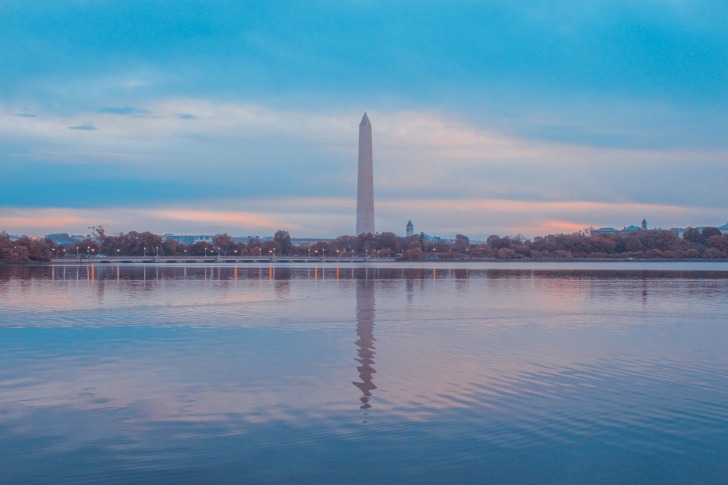

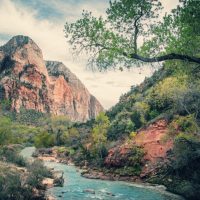

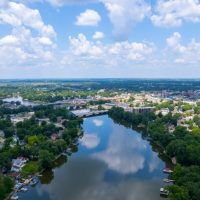

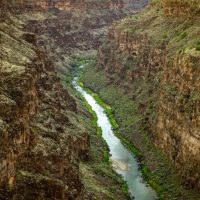





I had no idea alligators have been around for so long and haven’t changed at all.
Alligators have been in North America for eight million years, and while they may not have evolved much, they are still a fascinating and important part of our ecosystem.